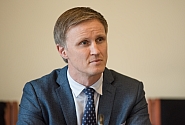
Even though it sometimes seemed the world had stopped due to the pandemic and remote work presented new challenges, Latvia’s foreign policy and its parliamentary dimension turned out to be unusually intensive last year, said Rihards Kols, Chair of the Foreign Affairs Committee of the Saeima, at the annual foreign policy debate of the Saeima on Thursday, 28 January.
“In 2020, we strengthened the existing forms of cooperation and established new ones. There was also unprecedented cooperation with Lithuania and Estonia as we joined forces, including at the parliamentary level, for our messages to become louder and carry more weight. We clearly witnessed this following the presidential election in Belarus: the Baltic states stood in solidarity with the Belarusian people, expressing unwavering and persistent support, and urging the European Union to impose sanctions, thus protecting our common values,” said Kols.
Regarding disinformation, Kols pointed out that we had already faced the problem before, but the pandemic underscored the ineffectiveness of our efforts to tackle disinformation. “The entire cyberspace is in need of rules and regulations, not just the sites we visit in our everyday life. We need to define the obligations of online platforms regarding disinformation, while at the same time protecting users from unreasonable limitations on the freedom of speech and violations of privacy. We are working on it at the European Union level, and this common duty may also strengthen transatlantic relations,” said Chair of the Committee.
The global economy is facing a major downturn, the relations of the transatlantic alliance are at their lowest point since its inception, and international institutions are in the midst of a legitimacy crisis, Kols highlighted. “The World Health Organisation has been justifiably criticised for its slow response to the pandemic and subsequently taking China’s side. It commended China’s supposed transparency and efforts to limit the spread of the virus, but ignored China’s crisis management mistakes at the beginning of the pandemic,” said Kols.
To emphasise the course taken last year by the largest geopolitical players around the globe, Kols highlighted the confrontation between the United States and China, which will be the determining factor for the 21st century international policy, regardless of who sits in the Oval Office. At the same time, despite its diminishing influence, Russia is still capable of damaging transatlantic stability and interests by carrying out violent attacks against the political opposition of the Kremlin, said Kols.
The political priorities of the European Union are moving towards an increasingly ambitious foreign policy, stated Kols, pointing out that Europe needs to be tougher when it comes to international relations. “In line with its common foreign policy strategy, the European Union needs to develop foreign policy departments that have special ambassadors for specific regions. Defined and clear strategies will allow the European Union to accelerate its decision-making process in the area of foreign relations, as well as its ability to cooperate with like-minded partners in order to solve common problems and protect its interests, norms and values in the post-pandemic world,” said Kols.
The first foreign policy debate of the second centenary of the de iure recognition of Latvia is different from the previous debates, yet very appropriate for the 21st century, symbolising the constant change in our lives and our work, emphasised the Chair of the Foreign Affairs Committee. Kols extended his gratitude to the foreign service for its selfless work throughout the years of protecting our country and representing its interests abroad. “The professionalism of the diplomatic and consular service while organising the largest repatriation operation in the history of Latvia last spring during the pandemic is a unique achievement and a direct attestation to this well-deserved appreciation,” said Kols.
Saeima Press Service







